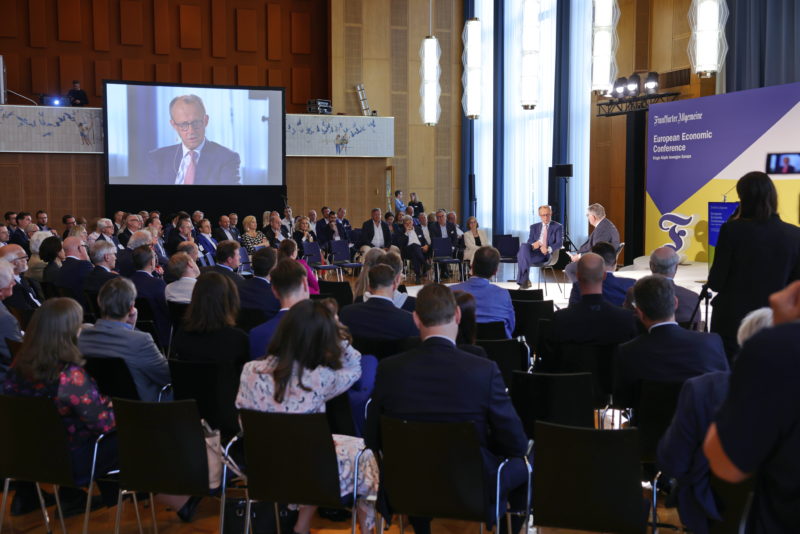
Over 260 guests registered for the conference, with two-thirds being company representatives, along with representatives from foundations and decision-makers at both state and federal levels. Gerald Braunberger, publisher of the FAZ, and Jörg Rocholl from the ESMT led political interviews featuring Wolfgang Schmidt, head of the Federal Chancellery, and Friedrich Merz, chairman of the CDU, among others.

“The EU needs to become more competitive,” Merz and Schmidt agreed, particularly in comparison to the USA and China. Another deficit of the EU, according to Merz, is the lack of a unified European capital market. Companies like CureVac and BioNTech prefer the New York Stock Exchange over European exchanges. Merz also emphasized the need to build a European defense industry. “With our fragmented industry, we are not able to be competitive. Out of 100 euros, 80 euros go to companies outside the EU. We need to stop designing specifications for joint projects in such a way that they become national projects again. We need to move towards joint projects. If it doesn’t work with all 27 states, then with those who are willing,” said the CDU party chairman.
You can watch the full interview with Friedrich Merz here.
“Cutting red tape: wish or reality?” asked Peter Adrian, President of the DIHK, Jörg Dittrich, President of the Central Association of German Crafts, and Klemens Haselsteiner, CEO of STRABAG SE. If we want to regain our competitiveness, we need to regain trust. Bureaucracy promises security to a dissolving security society, but this promise is no longer deliverable. Trust in the future and in society is needed. For the transformation process, entrepreneurial freedoms are necessary, and we need streamlined and unified regulations. Europe must look beyond its own borders. How can we align our trade policy with America, China, and Asia? The Commission must set framework conditions that ensure international competitiveness and allow the economy to breathe. After the Green Deal, the needs of small businesses and industry must be addressed.
This was followed by the Economy Talk with Vanessa Cann (Co-Founder of nyonic and Board Member of the AI Association), Julia Reuss (Public Policy Director for Central Europe at META), input on the US election campaign from former Obama’s campaign advisor Julius van de Laar, economic keynote speeches by Michael Kotzbauer (Board Member of Commerzbank AG) and Wolfgang Meier (CEO of Pirelli Deutschland GmbH), focusing on green financing and investments in high-tech locations.

Günther H. Oettinger, President of United Europe, who opened the second day of the third European Economic Conference, initially had little positive to say in response to Heike Göbel’s opening question, However, he also saw opportunities that Europe should seize.
“We always thought the West had won, that democracy would be exported, that it would have radiance and appeal. And now the backlash. We are in the middle of a battle of systems. How can democracy withstand autocracy and dictatorship, how can the social market economy withstand the planned economy, how can peace and respect for borders be maintained? We are doing too little for our security. We need a Europe that protects, with a strong Germany, with material, financial, and regulatory efforts also against fascists and populists from the right and left.
The citizens of Europe expect more to be done for security. Countries bordering Russia are already acting accordingly. There will be no defense commissioner in Europe because there is no European army. But there can be a commissioner for armament who efficiently develops the defense industry, reduces 16 types of tanks to two, promotes standardization, achieves synergies in weapon systems, and ensures the stockpiling of weapons and ammunition at the European level.
Competitiveness
In the last five years, the word “competitiveness” was not welcome in Brussels. But now we have a development that challenges the Green Deal. Commission President Ursula von der Leyen has announced that there will be an Industrial Deal alongside the Green Deal. Climate protection is undoubtedly a top priority. However, the approach that Europe and Germany are currently taking is far from exemplary. China is responsible for 33% of global greenhouse gas emissions, the USA accounts for 16%, India for 9%, Europe for 7.5%, and Germany for 2%. If we fail to achieve a smart balance between pragmatic climate protection, industrial growth, and competitiveness—particularly for small and medium-sized enterprises—and if we do not maintain and enhance prosperity, others will not follow our lead, and we will not establish ourselves as leaders in this domain.
Lisbon Strategy
In 2000, we decided in Lisbon that we wanted to become the most innovative and creative continent in the world, but since then, we have been falling behind annually. The USA is growing by 2.5% this year, Europe by 1%, Germany by 0.2%. And if we do not significantly increase competitiveness of our industry with more research funding, with longer working hours, we will not move forward.
“Competitiveness” means maintaining and making our quality of life, standard of living, and foundations future-proof. “It’s the economy, stupid”: This applies to Europe these days more than ever. Mandate holders in Brussels must strive for economic growth.”
What Are Europe’s Opportunities?
Horizon Europe
If we do not invest more in European research networks, we will never be able to compete with the research power of California, Boston, Shanghai, and Beijing. We will not be able to keep up with Microsoft, Google, Apple, or the American defense industry. But in the European team—Delft, Munich, Aachen, Darmstadt, Milan, Oxford, London, and Zurich—we have the potential, the excellence, and the capacity. Therefore, we need more funds; this network must be supported with European funds.
Internal Market
The capital markets union is currently a hot topic: Capital in Europe is flowing out, and there are not enough incentives for fundamental reform. We urgently need a single market for money and investors in a pan-European context. As the ECB lowers interest rates, one question becomes increasingly clear: What does fiscal discipline mean? It starts with the debt brake in Germany, continues with the Maastricht criteria, and concerns the immensely high national debt in France and Italy. I believe that Triple A ratings and the creditworthiness of Europe and its nation-states must be a focus in the coming years. I don’t know if I will live to see it, but at some point, the fiscal situation in the USA will burst. In the long run, this development will not be successful.
What Happens After the European Elections?
In the face of wars and crises, Europe should not wait until October to know who will take which positions and how top posts will be filled. Europe, Macron, Scholz, and Tusk, should strengthen their cooperation. Germany should not snub its partners, such as France, by ignoring any of the neighbor’s concerns.
Bureaucracy
Ms. von der Leyen promised: One in, one out! The result of the European machinery was four in, one out! The Carbon Border Adjustment Mechanism, Taxonomy, ESG, CSR, Corporate Sustainability Reporting Directive are just some of the regulations, mandates, prohibitions, and reporting requirements for European companies. We need to bolster security and reduce bureaucracy. This must also become a focus, or else anti-Europeans will continue to be on the rise.
The time of decline has begun for the West, for democracy, for prosperity, and for growth. Resisting that will be the art of the European Union in the coming years. The EU needs to become more effective in handling major issues and leave people and member states alone when it comes to smaller matters..”
You can watch the full speech by Günther H. Oettinger here.
For more information and videos on all the panels of the third European Economic Conference, please visit the European Economic Conference website at the following link.
SAVE THE DATE 2025
We are very pleased to announce the European Economic Conference #4. We will inform you about the program and guests in due course.

We thank the Frankfurter Allgemeine Zeitung and its publisher Gerald Braunberger, the F.A.Z. conference team, and the ESMT for the successful conference and collaboration.



